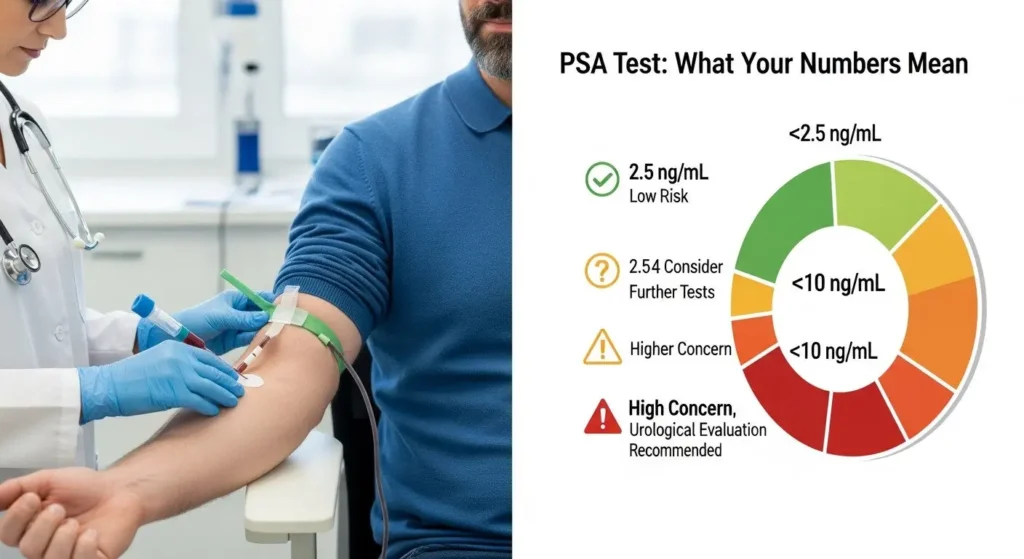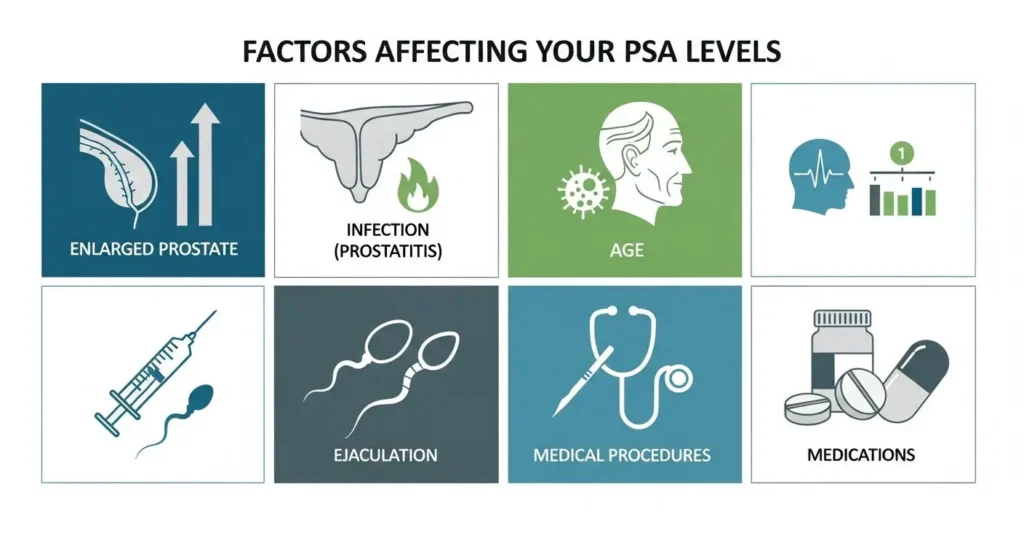Understanding your health is a powerful thing, especially as we get older. For men, one important part of health involves the prostate gland. This small gland plays a big role in the male reproductive system, and keeping an eye on its health is key. One of the main tools doctors use to check on prostate health is a simple blood test that measures something called Prostate Specific Antigen, or PSA.

You might have heard about PSA (Prostate Specific Antigen) tests, or perhaps your doctor has recommended one. But what exactly is PSA? What do the numbers mean? And why is it so important to understand your PSA levels? This guide will break down everything you need to know about Prostate Specific Antigen in an easy-to-understand way. We'll explore what PSA is, why you get tested, what your results might mean, and how you can take steps to keep your prostate healthy.
Key Takeaways
- PSA is a Protein: Prostate Specific Antigen (PSA) is a protein made by your prostate gland. It's found in your blood and helps doctors check on your prostate's health.
- Not Just About Cancer: While high PSA levels can be a sign of prostate cancer, they can also be caused by other common conditions like an enlarged prostate (BPH) or an infection (prostatitis).
- Understanding the Numbers: There's no single “normal” PSA number. Levels can vary based on your age, health, and other factors. Your doctor will look at your specific numbers and trends over time.
- Talk to Your Doctor: Deciding whether to get a PSA (Prostate Specific Antigen) test and understanding your results should always be a conversation with your doctor. They can help you weigh the pros and cons and decide on the best next steps.
- Proactive Health Matters: Eating healthy, exercising, and managing your weight are important steps you can take to support your overall prostate health.
What is Prostate Specific Antigen (PSA)?
Let's start with the basics. Your prostate is a small gland, about the size of a walnut, located just below your bladder. It wraps around the tube (urethra) that carries urine and semen out of your body. The prostate's main job is to produce a fluid that makes up part of semen, which helps sperm travel and survive.
Prostate Specific Antigen (PSA) is a protein that is made by the cells in your prostate gland. Think of it like a special marker for your prostate. A small amount of PSA is always present in your blood, which is normal. Its job in semen is to help make the semen thinner, so sperm can swim more freely.
When there's a problem with your prostate – whether it's an infection, an enlargement, or cancer – more PSA can leak into your bloodstream. This is why doctors use a PSA blood test to get an idea of what might be happening with your prostate. It's a key tool in checking on prostate health. 👨⚕️
The PSA Test: What It Is and Why You Get It
The PSA test is a simple blood test. A small sample of your blood is taken, usually from your arm, and then sent to a lab. The lab measures the amount of PSA in your blood, and the result is given in nanograms per milliliter (ng/mL).
Why do doctors recommend a PSA (Prostate Specific Antigen) test?
The main reasons for a PSA test are:
- Screening for Prostate Cancer: This is the most well-known reason. A higher-than-normal PSA (Prostate Specific Antigen) level can sometimes be a sign of prostate cancer. However, it's important to remember that it's not a perfect test and doesn't confirm cancer on its own.
- Monitoring Prostate Health: If you've been diagnosed with prostate cancer, PSA (Prostate Specific Antigen) tests are used to see how well treatment is working or to check if the cancer has returned.
- Investigating Symptoms: If you have symptoms like trouble urinating, frequent urination, or pain in your pelvic area, your doctor might order a PSA test along with other checks to find out the cause.
Who should get tested and when?
The decision to get a PSA test is a personal one and should always be made after talking with your doctor. Here's a general guide:
- Age 50 for average risk men: Men with an average risk of prostate cancer should consider talking to their doctor about testing around age 50.
- Age 40 or 45 for higher risk men: If you have a higher risk, such as having a father or brother who had prostate cancer before age 65, your doctor might suggest starting discussions about testing earlier, around age 40 or 45.
- African American men: African American men are also at higher risk and should discuss screening options with their doctor starting around age 40 or 45.
“A PSA test is a starting point, not a finish line. It gives us valuable information, but it's just one piece of the puzzle in understanding prostate health.”
Understanding Your PSA Levels: What Do the Numbers Mean?
Once you get your PSA (Prostate Specific Antigen) test results, you'll see a number. But what does that number actually mean for you? It's not as simple as “low is good, high is bad.” Many factors come into play.

For many years, doctors considered a PSA level of 4.0 ng/mL or lower to be “normal.” However, we now know that this isn't a hard and fast rule. What's considered normal can vary based on your age, your overall health, and even your ethnic background.
Here's a general look at how PSA (Prostate Specific Antigen) levels are often interpreted, but remember, these are just guidelines:
| PSA Level (ng/mL) | General Interpretation to the PSA test results, which can be affected by various prostate conditions.
What is a normal PSA level?
A normal PSA level is typically below 4.0 ng/mL. However, this can vary depending on age and other factors. For example:
- Men in their 40s: PSA levels generally below 2.5 ng/mL
- Men in their 50s: PSA levels generally below 3.5 ng/mL
- Men in their 60s: PSA levels generally below 4.5 ng/mL
- Men in their 70s: PSA levels generally below 6.5 ng/mL
These are just general guidelines. Your doctor will consider your individual situation.
Beyond the Single Number: Other Measures
Sometimes, a single PSA number isn't enough. Your doctor might look at other measurements to get a clearer picture:
- PSA Velocity: This looks at how fast your PSA level changes over time. A rapid rise in PSA, even if the number is still “normal,” can be a cause for concern.
- PSA Density: This compares your PSA level to the size of your prostate gland. If you have a larger prostate, it naturally produces more PSA.
- Free PSA: PSA in your blood can be “free” (not attached to other proteins) or “bound” (attached). The percentage of free PSA can sometimes help doctors tell the difference between prostate cancer and non-cancerous conditions. A lower percentage of free PSA might suggest a higher chance of cancer.
Factors That Can Affect PSA Levels (Beyond Cancer)
It's super important to know that a high PSA level doesn't automatically mean you have prostate cancer. Many other things can cause your PSA to go up. Here are some common ones:

- Benign Prostatic Hyperplasia (BPH): This is a very common condition in older men where the prostate gland gets bigger. A larger prostate means more prostate cells, which can produce more PSA (Prostate Specific Antigen). BPH is not cancer. Learn more about managing BPH and other prostate problems with Prostavive.
- Prostatitis: This is an inflammation or infection of the prostate gland. It can cause your PSA levels to rise quite a bit. Symptoms often include pain during urination, fever, and discomfort.
- Age: As men get older, their PSA levels naturally tend to increase, even without any prostate problems.
- Ejaculation: Having sex or ejaculating within 24-48 hours before a PSA test can temporarily increase your PSA level.
- Medical Procedures:
- A digital rectal exam (DRE), where the doctor feels your prostate, can cause a small, temporary rise in PSA. It's usually recommended to have your blood drawn for PSA before a DRE.
- A prostate biopsy (taking tissue samples) can significantly increase PSA for several weeks.
- Other procedures like cystoscopy can also affect PSA.
- Medications: Some medications can affect PSA levels. For example, some drugs used to treat BPH (like finasteride or dutasteride) can actually lower PSA levels. Make sure your doctor knows about all medications you are taking.
- Exercise: Intense exercise, especially cycling, which puts pressure on the prostate, can sometimes temporarily increase PSA.
- Urinary Tract Infections (UTIs): Infections in the urinary system can irritate the prostate and cause PSA to rise.
Because so many things can influence your PSA (Prostate Specific Antigen), your doctor will always consider your full health history and lifestyle when interpreting your results.
When a High PSA Level Is a Concern
If your PSA level comes back higher than expected, it's natural to feel worried. However, as we've discussed, it doesn't always mean cancer. Your doctor will look at several things:
- How high is the PSA (Prostate Specific Antigen)? A very high number (e.g., above 10 ng/mL) is more concerning than a slightly elevated one.
- How quickly has it changed? A rapid increase over a short period is more concerning than a slow, gradual rise.
- What are your symptoms? Are you having trouble urinating, experiencing pain, or noticing blood in your urine or semen?
- Your age and family history.
- Results of other tests, like a digital rectal exam (DRE).
What are the next steps if PSA is high?
If your PSA level is concerning, your doctor might recommend one or more of the following:
- Repeat PSA Test: Sometimes, a temporary factor (like an infection or recent ejaculation) might have caused the rise. Your doctor might suggest repeating the test after a few weeks, making sure to avoid factors that could influence the result.
- Free PSA Test: If not already done, this can help differentiate between BPH and cancer.
- Prostate MRI: This imaging test can provide detailed pictures of your prostate and help identify suspicious areas that might need further investigation.
- Prostate Biopsy: If other tests suggest a strong possibility of cancer, a biopsy is the only way to confirm a diagnosis. During a biopsy, tiny tissue samples are taken from your prostate and examined under a microscope.
“Don't panic if your PSA is high. It's a signal to investigate, not a diagnosis. Work closely with your doctor to understand what your numbers truly mean for your health.” ✅
The Debate Around PSA Screening
The PSA test has been a game-changer for prostate health, but it also comes with some debate. It's important to understand both the good and the less good aspects.
The Good (Pros of PSA Screening)
- Early Detection: The PSA test can help find prostate cancer at an early stage, often before symptoms appear. When found early, prostate cancer is usually more treatable.
- Potentially Life-Saving: For some men, early detection through PSA screening can lead to treatments that prevent the cancer from spreading and save their lives.
- Monitoring: For men already diagnosed with prostate cancer, PSA tests are invaluable for monitoring the disease and the effectiveness of treatment.
The Less Good (Cons of PSA Screening)
- False Positives: A high PSA doesn't always mean cancer. This can lead to anxiety, further unnecessary tests (like biopsies), and stress.
- Over-diagnosis and Over-treatment: The PSA test can find very slow-growing cancers that might never have caused problems or threatened a man's life. Treating these cancers might lead to side effects like incontinence (leaking urine) or erectile dysfunction, without actually improving quality of life or lifespan.
- False Negatives: Sometimes, a man can have prostate cancer even with a “normal” PSA level.
Because of these pros and cons, major health organizations have different recommendations for PSA screening. This is why a shared decision-making approach with your doctor is so important. You and your doctor should discuss your personal risk factors, your values, and your preferences to decide if and when PSA screening is right for you.
Improving Prostate Health Naturally
Taking care of your prostate health is part of your overall well-being. While you can't control every factor, many lifestyle choices can make a positive difference.

1. Eat a Healthy Diet
Focus on a diet rich in:
- Fruits and Vegetables: Especially those high in antioxidants, like tomatoes (lycopene), broccoli, and berries.
- Healthy Fats: Found in foods like avocados, nuts, seeds, and olive oil. Omega-3 fatty acids, found in fish like salmon, are also beneficial.
- Lean Proteins: Choose chicken, fish, and plant-based proteins over large amounts of red meat.
- Limit Processed Foods: Reduce your intake of sugary drinks, refined grains, and unhealthy fats.
2. Stay Active
Regular physical activity is good for your whole body, including your prostate.
- Aim for at least 30 minutes of moderate exercise most days of the week.
- Activities like walking, jogging, swimming, or cycling (if it doesn't cause discomfort) can help maintain a healthy weight and improve blood flow.
3. Maintain a Healthy Weight
Being overweight or obese can increase your risk of various health problems, including some prostate issues.
- Combine a healthy diet with regular exercise to achieve and maintain a healthy weight. If you're looking for ways to support your weight management journey, you might find information on Liv Pure reviews helpful, as liver health is linked to overall metabolism.
4. Stay Hydrated
Drinking enough water helps flush out toxins and keeps your urinary system functioning well.
5. Consider Prostate Supplements (with doctor's approval)
Some men choose to take supplements to support prostate health. These often contain ingredients like saw palmetto, beta-sitosterol, pygeum, and zinc.
- It's crucial to talk to your doctor before starting any new supplement to ensure it's safe and won't interfere with any medications.
- For a detailed look at options, you can explore the most effective prostate supplements reviewed for 2025.
- If you're interested in a natural approach, you might want to read about Prostavive: the natural solution for prostate health.
- To make an informed decision, it's helpful to review a comprehensive guide to prostate supplements.
6. Manage Stress
Chronic stress can impact your overall health. Find healthy ways to manage stress, such as meditation, hobbies, or spending time with loved ones.
Living with Prostate Health Concerns
Whether you're proactively monitoring your PSA (Prostate Specific Antigen), managing BPH, or dealing with a prostate cancer diagnosis, living with prostate health concerns requires a thoughtful approach.
- Regular Check-ups: Continue to have regular check-ups with your doctor. These visits are crucial for tracking your health over time and catching any changes early.
- Open Communication: Don't hesitate to ask your doctor questions. The more you understand, the better equipped you'll be to make decisions about your health. Discuss your concerns, symptoms, and any lifestyle changes you're making.
- Seek Support: If you're dealing with a serious diagnosis, support groups, family, and friends can provide emotional and practical help. Knowing you're not alone can make a huge difference.
- Stay Informed: Keep learning about prostate health. Reputable sources, like this article and your healthcare provider, can help you stay up-to-date on new research and treatments.
Conclusion
Understanding Prostate Specific Antigen (PSA) levels is an important part of men's health. While a PSA test can be a valuable tool for screening and monitoring prostate conditions, it's essential to remember that it's just one piece of the puzzle. A high PSA doesn't automatically mean cancer, and many factors can influence your numbers.
The most crucial step is to have an open conversation with your doctor. They can help you interpret your results in the context of your unique health history, risk factors, and lifestyle. By staying informed, making healthy choices, and working closely with your healthcare team, you can take control of your prostate health and overall well-being. Your health is your wealth, and being proactive is the best way to protect it.








